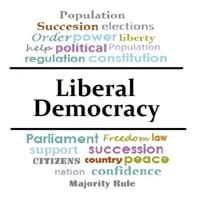

The most prominent defenses of liberalism today are either laundry lists of its past glories or misplaced attacks on “identity politics” and “political correctness,” neither of which are adequate to the challenge presented by liberalism’s newly vital critics on the reactionary right or socialist left. The defenses from America’s liberal intellectual elite have been weak at best. “The sort of change we require can only come from elsewhere, from a project that is at the very least anti-neoliberal, if not anti-capitalist.” “Neoliberalism in any guise is not the solution but the problem,” Nancy Fraser, a professor at the New School, writes. Liberalism’s vision of the economy as a zone of individual freedom, in their view, has given rise to a deep system of exploitation that makes a mockery of liberal claims to be democratic - an oppressive system referred to as “neoliberalism.” Left anti-liberals, by contrast, pinpoint liberal economic doctrine as the source of our current woes. Liberalism “constantly disrupts deeply cherished traditions among its subject populations, stirring unrest, animosity, and eventually political reaction and backlash,” Harvard law professor Adrian Vermeule, one of the most prominent of the reactionary anti-liberals, said in a May speech. In their view, these ideas are solvents breaking down America’s communities and, ultimately, dissolving the very social fabric the country needs to prosper. On the right, the anti-liberals locate the root of the problem in liberalism’s social doctrines, its emphasis on secularism and individual rights. Their arguments tap into a deep sense of discontent among the voting public, a collapse of trust in the political establishment, and a growing sense that institutions like Congress aren’t delivering what the public needs. But they are united in believing that American liberalism as currently constituted is past its expiration date, that it is buckling under the weight of its contradictions. Unlike Schmitt and Putin, the intellectual critics of liberalism opponents do not typically challenge democracy itself. It is a belief that “the liberal idea has become obsolete,” as Russian President Vladimir Putin recently declared. These shocks to the system show, in the eyes of liberalism’s contemporary critics, that something is profoundly wrong with the fundamental ideas that define our politics. They stem from real-world crises, most notably the 2008 Great Recession and the rise of far-right populists like Donald Trump to power. These criticisms do not arise in a vacuum. In recent years, serious thinkers on both the left and right have launched a sustained assault on the United States’ founding intellectual credo.

Schmitt haunts our political moment because we are seeing a flowering of criticism of American liberalism. His philosophical critique predicted political reality. Schmitt saw something in German politics, deep flaws in its liberal order, before they became obvious to other political observers and ordinary citizens. Not about his dark fate - he became an enthusiastic Nazi - but instead about his prescience. I’ve been thinking about Schmitt a lot lately.

The struggle between the Nazis and their opponents could not be resolved through parliamentary compromise the Weimar Republic fell to fascism and took the rest of the continent down with it.Ĭarl Schmitt in 1932. Schmitt’s critique of liberalism proved terrifyingly accurate. ”It is, in its depths, the inescapable contradiction of liberal individualism and democratic homogeneity.” “Even if Bolshevism is suppressed and Fascism held at bay, the crisis of contemporary parliamentarism would not be overcome in the least,” he wrote in 1926. Politics at its core is not about compromise between equal individuals but instead conflict between groups. Liberal institutions like representative democracy, and the liberal ideal that all a nation’s citizens can be treated as political equals, were in his view a sham. One contemporary observer, a legal theorist in his mid-30s named Carl Schmitt, found the seeds of the crisis within the idea of liberalism itself. In 1923, Hitler staged an abortive coup attempt in Bavaria, the so-called Beer Hall Putsch - a failure that nonetheless turned Hitler into a reactionary celebrity, a sign of German discontent with the post-war political order. Shortly after its post-World War I creation, the foundations of Germany’s Weimar Republic began to quake.


 0 kommentar(er)
0 kommentar(er)
